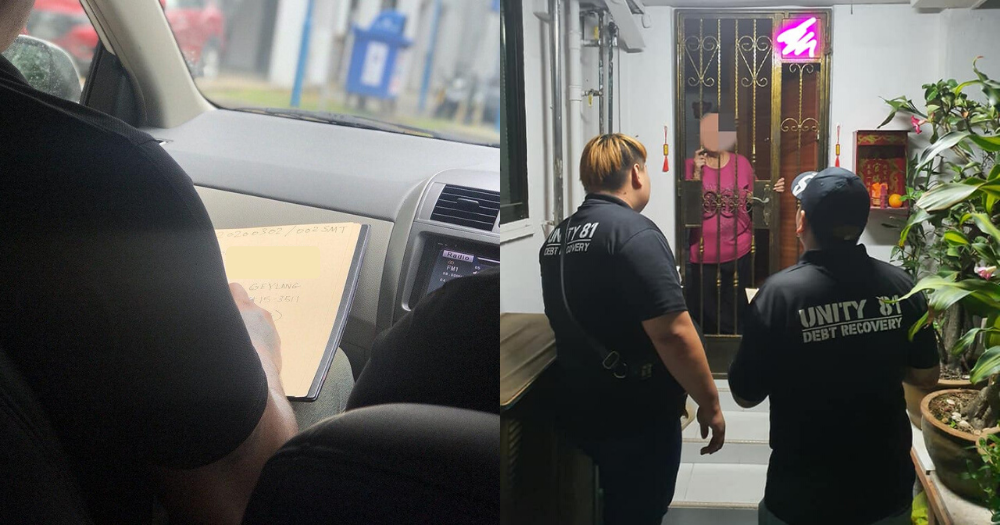"My greatest fear today is if we go to a family member's or a friend's house," I said to my colleague Angela, minutes before we set off to the first house of the day.
It was a Sunday (Feb. 9), and while I am admittedly a wallflower, I did not say that because of my reluctance to socialise.
On the contrary, we were shadowing three debt collectors from Unity 81: Raymond, Willy, and Win.
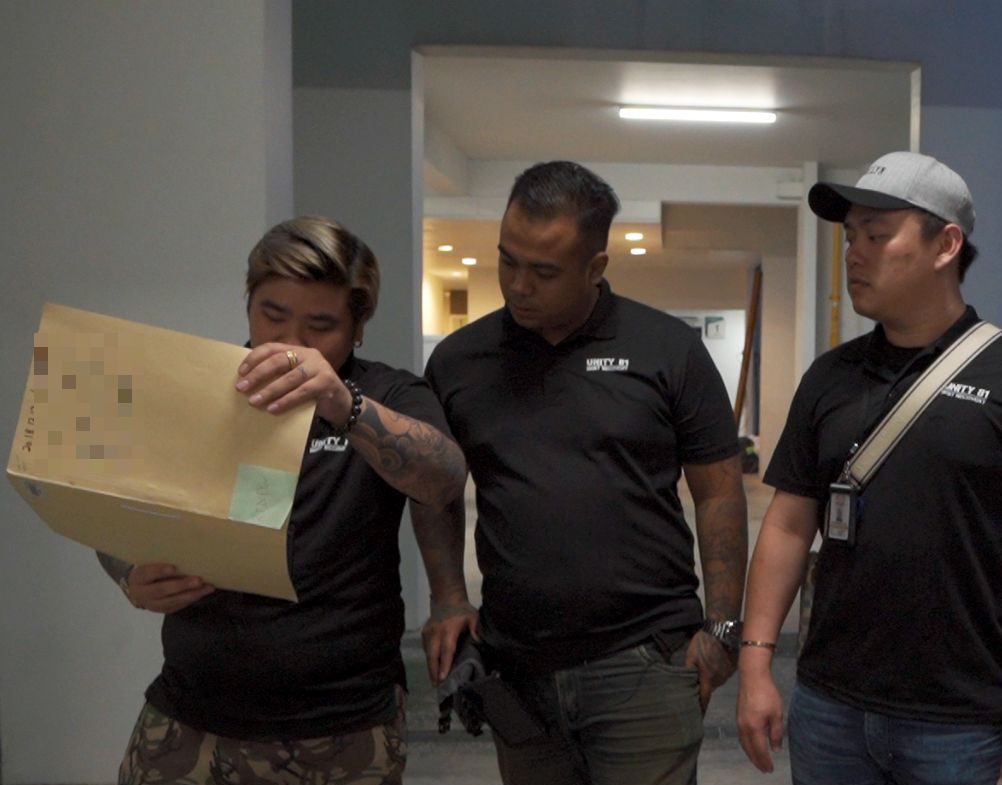 Photo by Angela Lim.
Photo by Angela Lim.
Not loansharks
These men may be burly with a myriad of tattoos, but they are far from the paint-splashing or pig head-hanging loansharks that are often portrayed on television.
For the uninitiated, Unity 81 is a licensed debt collection agency in Singapore that started in 2017.
"Our company is registered with the Accounting and Corporate Regulatory Authority (ACRA) and we operate within legal boundaries," Raymond, the agency's operational manager, told us.
Unlike loansharks, they act as a third-party debt collector for their clients and do not deal with moneylending at all.
Proof of debt
There are two kinds of debt: Commercial debts (between service providers and clients) and personal debts (between family or friends).
In his experience as a debt collector, Raymond shared that he has seen debts ranging from S$1,500 to S$1.4 million.
While on the way to the first house, he explained that proof of debt has to be presented before they accept a job.
A proof of debt can be presented in any form (even a WhatsApp conversation), as long as there is an acknowledgement by the debtor.
Here are also some other requirements:
- Debt has to be a minimum of S$1,500.
- The debt must have happened within 5 years.
- The debtor cannot be a minor.
Festive periods busiest
This year, they visited more than 50 houses over the first three days of Chinese New Year.
According to them, festive periods, including Deepavali and Hari Raya, are considered the peak periods for them.Win said: "The response is definitely better. Some debtors, they are not at home (on normal days) but during festive periods like Chinese New Year, they will come back."
Sacrifice for family
Them working on the first three days of the festive occasion doesn't just upset the debtors, it also upsets the collectors' families.
But according to Willy, it's a sacrifice they are willing in order to provide a comfortable life for their loved ones.
"We also want to take care of them, that's why we work."
Letter of demand
We finally arrived in Kallang, where the first house is located.
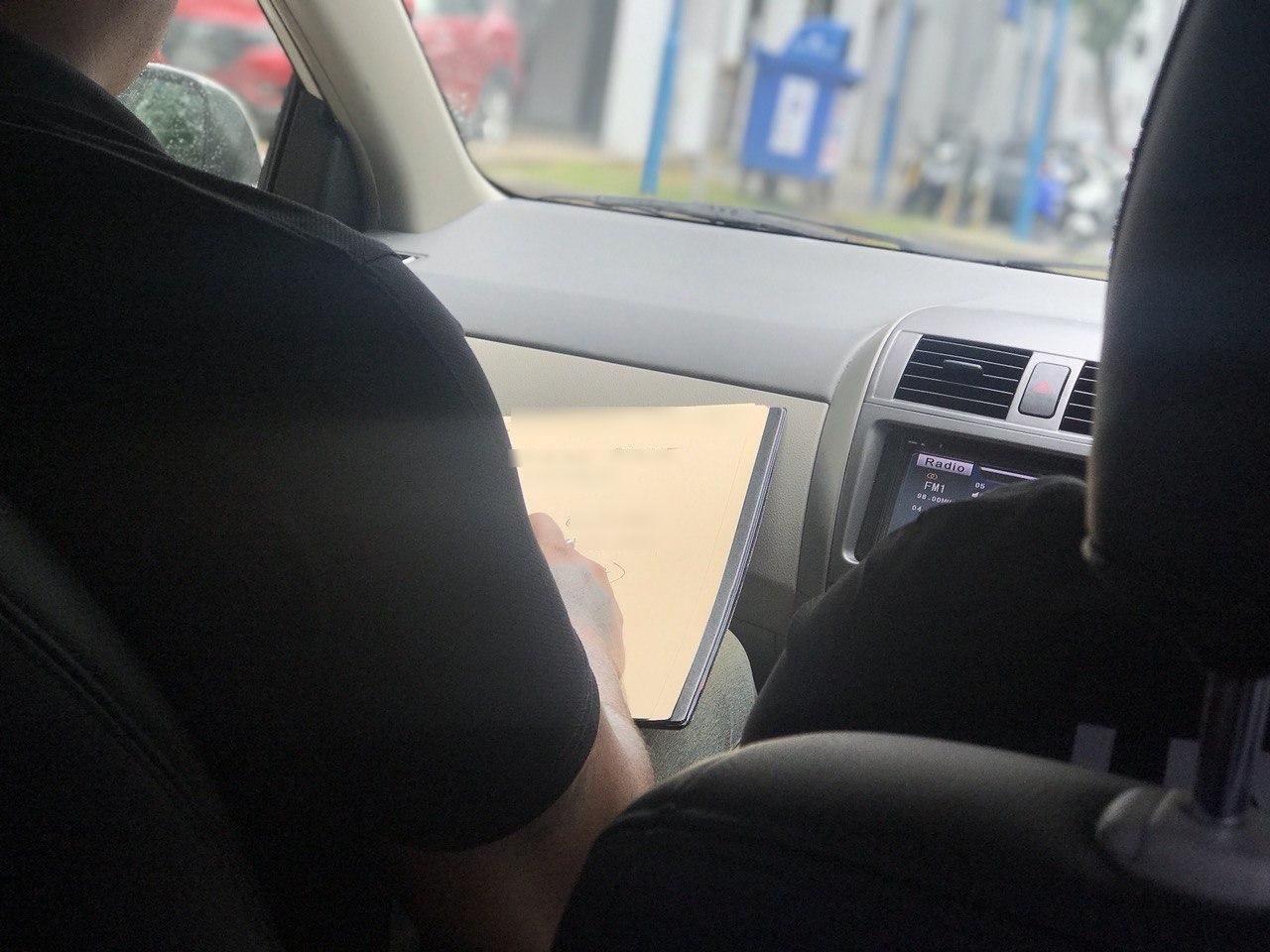 Willy looking through the first case file. Photo by Fasiha Nazren.
Willy looking through the first case file. Photo by Fasiha Nazren.
This also happened to be their first visit to the debtor's house as she had not responded to the letter of demand.
Sending a letter of demand to the debtor is a standard procedure and is typically the first step of debt collecting.
If the debtor does not respond to the letter after a week, the collectors will then proceed to do a house visit.
On a regular day, only a maximum of four staff will go for the visits together.
Any more than four and they can be charged by the police for unlawful assembly.
Greeted nicely
When they knocked on the door of the debtor's unit, they were greeted by a confused-looking elderly woman.
"Hello, auntie. Is this Michelle's (not her real name) house?" Raymond asked the woman nicely.
Again, the polite exchange was a stark contrast from the loansharks that are often depicted as rowdy and uncouth gangsters.
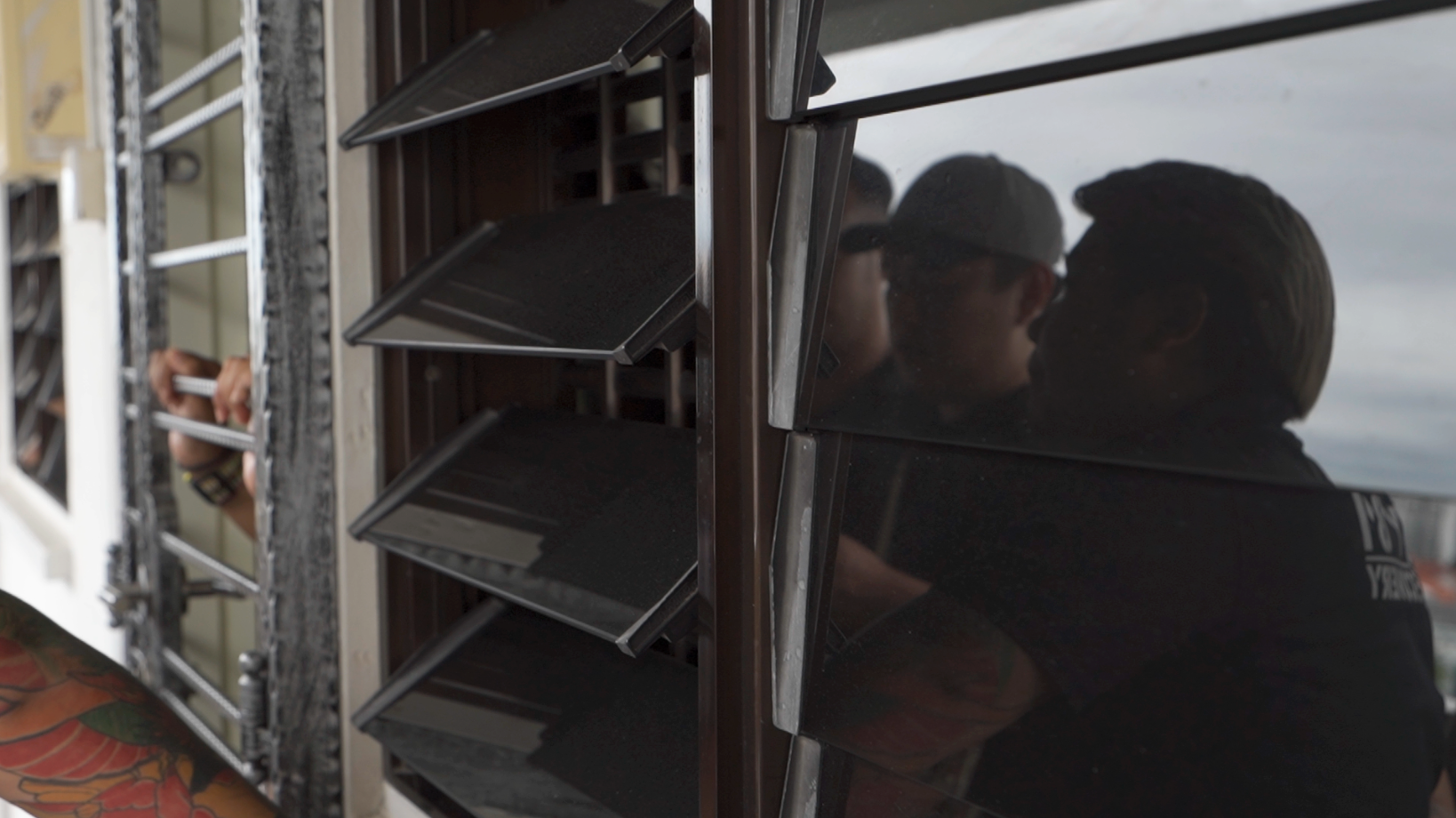 Photo by Angela Lim.
Photo by Angela Lim.
Michelle then came to the door along with her father.
Gawking neighbours
Willy took over the conversation to explain to them that they are there on behalf of a car rental company to collect a debt of S$1,050.
(Note: A car rental company may have multiple debtors. As long as the combined sum owed is more than S$1,500, Unity 81 will take on the job.)
After a while, neighbours began to gawk and tried to eavesdrop on the conversation.
The sight of three big men dressed in black, it seems, wasn't so common in this quiet neighbourhood.
Embarrassed, the father gathered the debt collectors to a quiet corner of the corridor and told them that he'd like to settle the debt for his daughter.
After passing crisp S$100 and S$50 bills to the collectors, he was asked to sign a letter to acknowledge that the debt has been paid for.
"That was easy," I thought to myself.
Before sending us off to the lift lobby, the father apologetically said: "Sorry ah, It's very embarrassing for the family... Neighbours can see..."
We exchanged goodbyes and that was, quite inconsequentially, the end of the first visit.
The waiting game
I must admit, for some reason, it felt a little strange to smile and wave goodbye to a debtor.
Win even joked: "You guys are lucky, first house and the debtor is already very, very nice."
In reality, the collectors explained, not all debtors are as cooperative.
"Out of 10 debtors, maybe around seven to eight will not even open their doors," said Raymond.
When that happens, they can wait for a few hours for the debtor to turn up.
"Sometimes we have no choice but to wait. The longest we have waited was four hours. But in the end, it's good if we manage to find the debtor and negotiate an instalment plan with them," explained Raymond.
 Sometimes they have to have their meals in the car while waiting for debtors. Photo from Unity 81's Facebook page.
Sometimes they have to have their meals in the car while waiting for debtors. Photo from Unity 81's Facebook page.
Knives in their faces
And it probably goes without saying that some debtors have been aggressive.
While some debtors have raised their voices, others have pointed knives in their faces or splashed hot water towards them.
Despite being physically attacked, Raymond stressed that they do not respond with violence themselves.
"If we feel that there is a breach of peace or if it is life-threatening, then we have no choice but to call the police."
Nowadays, as an added measure, they are always equipped with body cameras to record their visits.
Over S$600,000 in debt
Speaking of hostile behaviour, the second debtor we visited was a man who has a commercial debt of over S$600,000.
This was their third visit to the debtor.
The man initially agreed to a monthly instalment plan but defaulted on payment after a while.
After a long sigh, Willy said: "He has provoked us and even acted like he wanted to beat us up."
As a precaution, the Mothership crew was also advised to keep a safe distance just in case he would get physical.
Fortunately, this visit was rather uneventful, save for a visit by the police.
Police called to the scene
The debtor had called the police after the collectors knocked on his door several times.
When the police arrived, the Mothership crew was told to stop recording any footage and to leave.
After 15 minutes, the collectors and the police finally left the debtor's unit.
There was only so much they could do, especially since the police was involved.
"He gave excuses such as he was cooking and that he was sick. The policemen were also just doing their job to prevent a breach of peace."
Default on payment not uncommon
Defaulting on payment isn't exactly uncommon.
When that happens, the debtors would have to continue with their visits for the rest of the one-year contract with their clients.
Once the contract ends, it is up to the client to cease or extend the contract.
In this line of career, they have met debtors of as young as 18 years old and as old as 72 years old.
I couldn't help but ask — what would happen if a debtor were to pass on before paying off their debt?
All of them agreed that it wouldn't be right to collect debts from the family of a deceased debtor.
"If they insist, they (clients) can visit the debtor at the hell gate," Raymond quipped.
Eighth visit's the charm?
By sundown, we were at the third and final house.
On a normal day, however, they would have managed to visit eight to nine houses.
The last debtor owes a car rental company more than S$5,000 and this was their eighth time visiting his house.
And eight times still wasn't the charm.
When the collectors knocked on the door of the debtor's house, they were told by his wife that he wasn't at home.
Collectors may know more than family
She apparently told the collectors that her husband had settled the debt with the car rental company separately.
However, Raymond explained to her that this wasn't communicated to them, and the clients would typically prefer for debtors settle the debt with the collectors instead.
It was also worth noting that it seemed like the collectors knew more details about the man than his own wife did.
Here's a gist of the entire conversation:
Collectors: What is he working as now?
Wife: I don't know.
Collectors: Still doing logistics?
Wife: I really don't know what he's working right now.
Collectors: Ok, can you give us his phone number?
Wife: No, sorry cannot. I don't think he will like that.
Collectors: We will give you our name card and let him call us instead so we can negotiate an instalment plan for his debt. But if he doesn't call back, we have no choice but to come again.
Wife: Ok, I will make him call you.
A neutral party
It may be understandable why a debtor would try to avoid a debt collector, especially if they are financially tight.
They are hired by the creditor so by default, whatever the creditor says goes, right?
That is, unfortunately, a very common misconception.
In fact, debt collectors like Unity 81 try to act as a neutral party between the creditor and debtor.
"Debtors would think we are always siding the client (creditors). But we are the middle man. We always try to understand the situation on both sides and suggest an appropriate instalment plan."
They have even helped some debtors who were facing financial difficulties to find a job so they can afford an instalment plan.
"Right now the economy is very bad and some of them may be jobless, so us constantly visiting them wouldn't solve the problem. They can't afford to pay. They can't even afford their children's school fees and daily essentials so we try to help get a job."
On a case-by-case basis, the company may even fork out some cash to tide debtors over a difficult period.
"If we don't do it, then nobody will."
And just like that, the long day ended at around 9pm. The usual time they knock off from work.
The long hours at work means that they don't get to spend a lot of time with their family and friends.
The nature of their job, of course, makes their family worry for their safety and well-being.
But Raymond stressed that it's a job that not a lot of people can do:
"It's an honest job and this is our job. If we don't do it, then nobody will."
Of course, on their off days, they dedicate most of their time to unwind with their families.
A call from a suicidal client
He also shared that the people they meet have made their work more fulfilling.
One memorable client he had was a suicidal 55-year-old woman.
"When she called us, she said that she wanted to commit suicide. We thought it was a prank call but we rushed down to attend to her anyway."
When they met her, they found out that she had initially hired a debt collector to help her collect a debt of over S$13,000 from a tenant.
On top of not being able to collect the debt, the other debt collector also borrowed a sum of S$3,000 from the woman.
"He promised that he will pay her within a certain date but when she tried to call him, there was no response. He blocked her number," Raymond revealed.
More than S$16,000 poorer, the unemployed woman also shared that she was a widow and lived alone.
"I was tearing a bit when she told us what happened. When she was talking to us, we can tell she was depressed. She was crying and telling us that she would end her life if we don't help her."
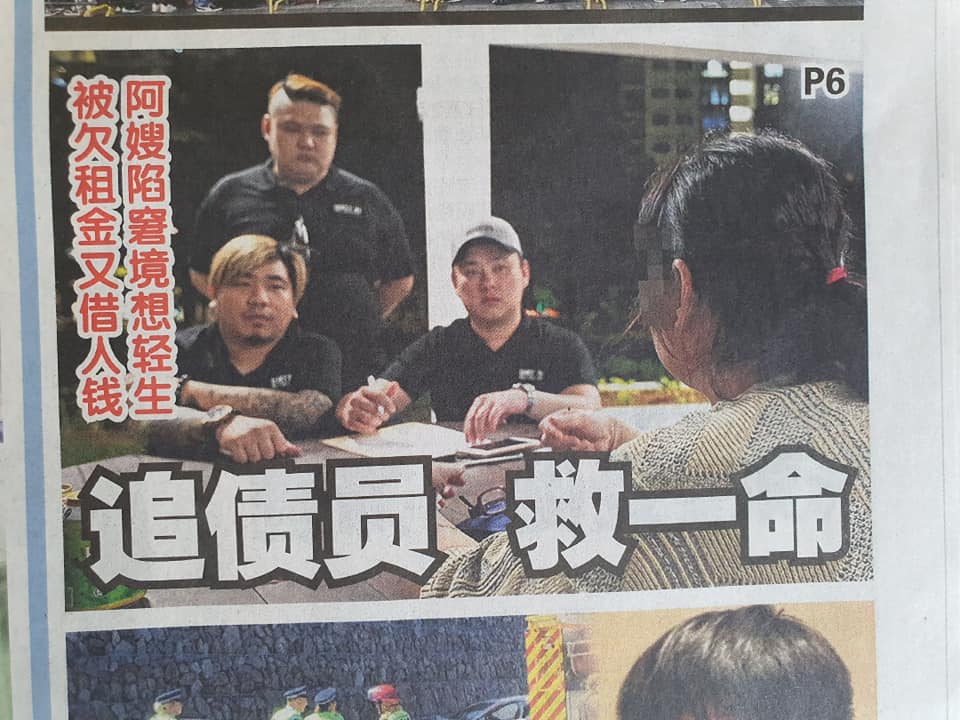 This case was also reported on Lianhe Zaobao.
This case was also reported on Lianhe Zaobao.
In the end, they managed to find the collector and agreed to pay a monthly instalment of S$200.
Unity 81 also refused to accept any payment from the woman and their boss gave her S$500 to help her financially.
Debt-free clients make it worthwhile
But it doesn't take a tear-jerking case for them to continue doing what they do.
For Willy, simply seeing their people debt-free makes what they do worthwhile.
"Everyone also needs money so we want to try help our clients get their money and for debtors to be debt-free. The most fulfilling thing is when you see debtors finish paying off their loans. When you see them feel accomplished, it also makes us happy."
Top image by Angela Lim
If you like what you read, follow us on Facebook, Instagram, Twitter and Telegram to get the latest updates.
